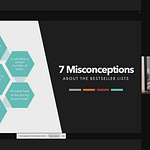Charles Duhigg knows a thing or two about writing books that break through. A Pulitzer Prize–winning journalist and bestselling author of The Power of Habit, Smarter Faster Better, and Supercommunicators, his work has shaped how millions of readers think about productivity, communication, and human behavior. His books have spent years on bestseller list…
Playback speed
×
Share post
Share post at current time
Share from 0:00
0:00
/
0:00
Paid episode
The full episode is only available to paid subscribers of Author Insider
8 Lessons on Writing and Publishing from Charles Duhigg
The Pulitzer Prize–winning author of The Power of Habit and Supercommunicators shares candid advice on proposals, audiences, advances, and the deeper purpose of books.
Sep 30, 2025
∙ Paid
Author Insider
Ready to level up your writing career? Author Insider delivers exclusive strategies and interviews with top publishing experts to help you thrive in today's competitive market. Join now and turn your writing into a business.
Ready to level up your writing career? Author Insider delivers exclusive strategies and interviews with top publishing experts to help you thrive in today's competitive market. Join now and turn your writing into a business.Listen on
Substack App
RSS Feed
Appears in episode

Charles Duhigg
Writes The Science of Better Subscribe
Recent Episodes










